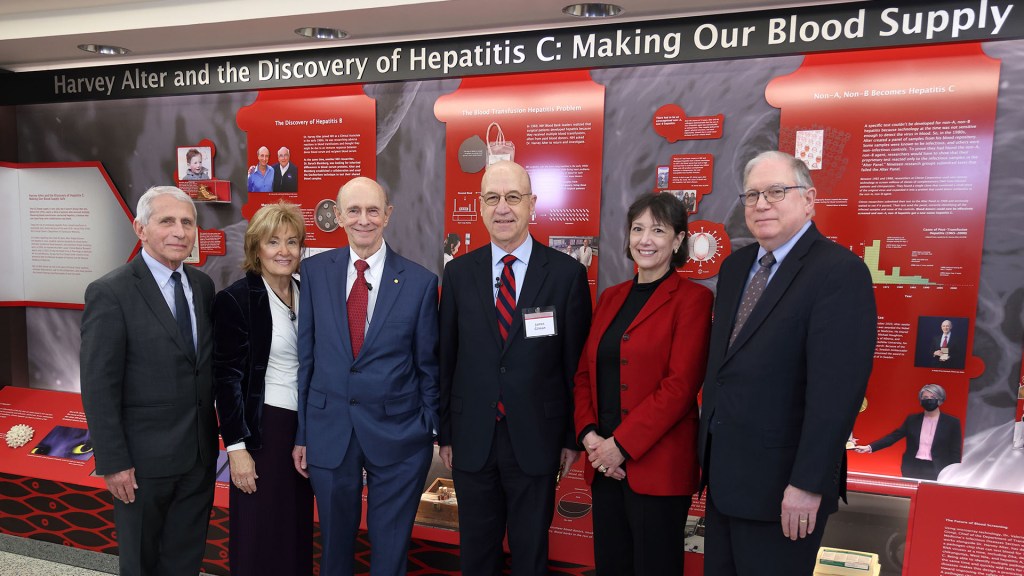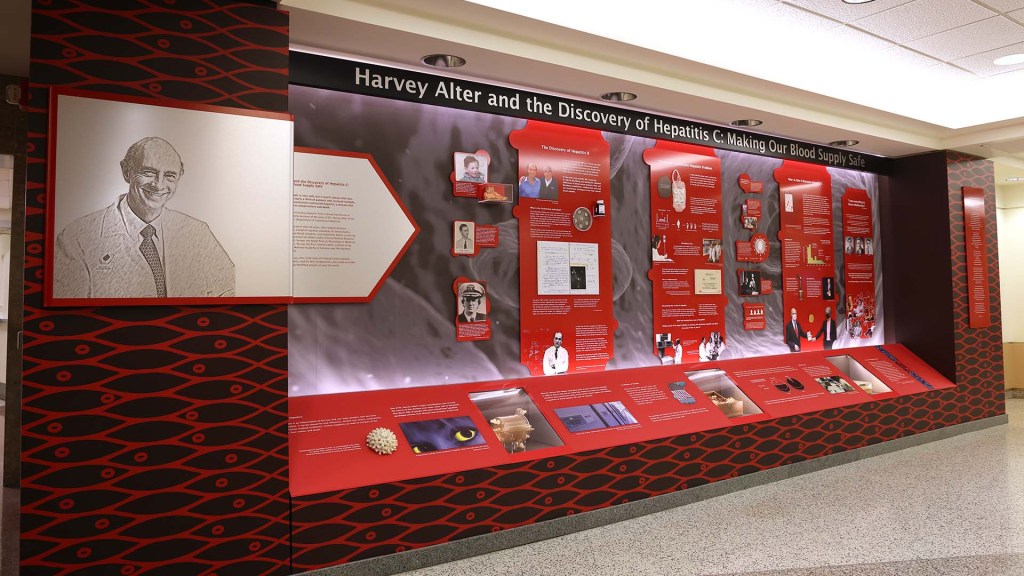history
Celebrating New Clinical Center Exhibit for Nobel Laureate Dr. Harvey Alter
Posted on by Dr. Monica M. Bertagnolli

Earlier this month, I had the great honor of attending the opening of an exhibit at the NIH Clinical Center commemorating the distinguished career of Dr. Harvey Alter. Harvey’s collaborators, colleagues, and family members joined him to celebrate this display dedicated to his groundbreaking hepatitis C work developed by the Office of NIH History and Stetten Museum.
As I remarked at the event, we at NIH are proud to be able to claim Harvey as our own. He has spent almost the entirety of his professional career at the Clinical Center, working as a scientist in the Department of Transfusion Medicine since the 1960s.
Those who view this permanent exhibit will learn about how Harvey’s dedicated research has transformed the safety of the U.S. blood supply. Before the 1970s, nearly a third of patients who received multiple, lifesaving blood transfusions contracted hepatitis. Today, the risk of contracting hepatitis from a blood transfusion is essentially zero, thanks largely to Harvey’s research advances, including his work to identify the hepatitis C virus, which earned him the 2020 Nobel Prize in Physiology or Medicine. A cure for hepatitis C became available in 2014, and former NIH Director Dr. Francis Collins, who was at the event, has been working with President Biden to ensure greater access to these medications as part of an effort to eliminate hepatitis C in this country. This important work would not have been possible without Harvey’s foundational discoveries. Harvey is one of six Nobelists who did the entirety of their award-winning research at NIH as federal scientists, and the only NIH Nobel laureate to be recognized for clinical research.
This exhibit in the busy halls of the Clinical Center is a good reminder to the many who pass by of why we do what we do: It can take long hours and many years, but we can make a significant impact in clinical care when we try to understand the root causes of problems. Please stop by when you’re there to learn more about Harvey’s remarkable career.

A Tribute to Two Amazing Scientists
Posted on by Dr. Francis Collins

Caption: Sir John Sulston (left) and Stephen Hawking (right)
Credit: Jane Gitschier, PLoS; Paul Alers, NASA
Over the past couple of weeks, we’ve lost two legendary scientists who made major contributions to our world: Sir John Sulston and Stephen Hawking. Although they worked in very different areas of science—biology and physics—both have left us with an enduring legacy through their brilliant work that unlocked fundamental mysteries of life and the universe.
I had the privilege of working closely with John as part of the international Human Genome Project (HGP), a historic endeavor that successfully produced the first reference sequence of the human genetic blueprint nearly 15 years ago, in April 2003. As founding director of the Sanger Centre (now the Sanger Institute) in Cambridge, England, John oversaw the British contributions to this publicly funded effort. Throughout our many planning meetings and sometimes stormy weekly conference calls about progress of this intense and all-consuming enterprise, John stood out for his keen intellect and high ethical standards.
FDA Approves First CAR-T Cell Therapy for Pediatric Acute Lymphoblastic Leukemia
Posted on by Dr. Francis Collins
Tremendous progress continues to be made against the Emperor of All Maladies, cancer. One of the most exciting areas of progress involves immunotherapy, a treatment strategy that harnesses the natural ability of the body’s own immune cells to attack and kill tumor cells. A lot of extremely hard work has gone into this research, so I was thrilled to learn that the Food and Drug Administration (FDA) just announced today its first approval of a promising type of immunotherapy called CAR-T cell therapy for kids and young adults with B-cell acute lymphoblastic leukemia (ALL)—the most common childhood cancer in the U.S.
ALL is a cancer of white blood cells called lymphocytes. Its treatment with chemotherapy drugs, developed with NIH support, has transformed ALL’s prognosis in kids from often fatal to largely treatable: about 90 percent of young patients now recover. But for those for whom the treatment fails, the prognosis is grim.
In the spring of 2012, Emily Whitehead of Philipsburg, PA was one such patient. The little girl was deathly ill, and her parents were worried they’d run out of options. That’s when doctors at Children’s Hospital of Philadelphia gave Emily and her parents new hope. Carl June and his team had successfully treated three adults with their version of CAR-T cell therapy, which is grounded in initial basic research supported by NIH [1,2]. Moving forward with additional clinical tests, they treated Emily—their first pediatric patient—that April. For a while, it was touch and go, and Emily almost died. But by May 2012, her cancer was in remission. Today, five years later, 12-year-old Emily remains cancer free and is thriving. And I’ve had the great privilege of getting to know Emily and her parents over the last few years.

